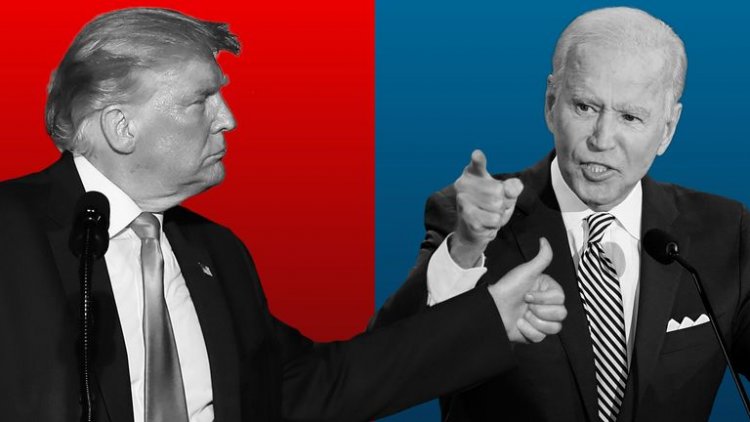US Elections 2020: Can Court Be The Deciding Factor?

Washington: Democrat Joe Biden has a path to victory in the US election but his Republican opponent President Donald Trump is challenging vote counts in four key states.
Usually, when the data shows a candidate has an unbeatable lead, the major US networks declare one candidate the winner. This tends to happen in the early hours of the morning after voting day.
These are not official, final results - they are projections, and the final official tally has always taken days to count.
But this year's massive volume of postal votes means the counting is taking longer, especially as some battleground states have not allowed counting ahead of election day.
So they have had to count everything on the day itself, and counting postal votes can take longer than in-person votes due to verification requirements.
If races are too close to call, and neither candidate concedes, it's normal for the counting to go on, says Matthew Weil, director of the Bipartisan Policy Research Center's elections project.
Before Tuesday's vote, there were more than 300 lawsuits across 44 states regarding postal and early voting in elections this year.
They centred on a range of issues such as the deadline for posting and receiving ballots, the witness signatures required and the envelopes used to post them.
Republican-run states said restrictions were necessary to clamp down on voter fraud. But Democrats said these were attempts to keep people from exercising their civic rights.
The president's campaign said it has requested a recount in Wisconsin "based on abnormalities seen" on Tuesday.
It's unclear when this recount would take place, however, since typically these do not happen until after the county officials finish reviewing the votes. The state's deadline for this part of the process is 17 November.
Columbia University Law School professor Richard Briffault says there was a recount in Wisconsin in 2016 as well, and it "changed about a hundred votes".
"A recount is not a means of, challenging the legality of a vote," he explains. "It's just about literally a means of making sure that the calculations are right."
Mr Trump won the state in 2016 by his slimmest margin - just over 10,700 votes. On 4 November, his campaign announced a lawsuit to stop the count there, though 96% of the votes have already been unofficially tallied by local election officials.
Thousands of votes remain uncounted and many come from regions that are historically Democratic, but US outlets and the BBC are projecting a win for Mr Biden.
The challenge here centres on the state's decision to count ballots that are postmarked by Election Day but arrive up to three days late. Republicans are seeking an appeal.
Mr Weil says he is most concerned about this dispute as the nation's top court was deadlocked on it before the election and before Justice Amy Coney Barrett joined.
"They did indicate in some of their dissents that they would be interested in taking it after. So I do think there is a risk that some of those [postal] ballots that were cast by election day and not received until Friday may be discarded. I think that would be the wrong result, but I think that is a legally possible result."
But Weil adds that the election would have to be "very, very close for that to matter". He points out that state officials had sent out messaging ahead of election day urging voters to turn in their absentee ballots at polling places instead of posting them. "So my guess is that it's not going to be a huge number of ballots that could be thrown out, if that was the case."
Prof Briffault also points out that the ballots arriving late are being counted separately, and says if Mr Biden can pull ahead without those being tallied, he sees no basis for a legal challenge.
But the Trump campaign has declared victory in the state though there are more than a million votes still to be tallied. No major US networks have yet projected a winner.
State Republicans and Mr Trump's campaign have filed a lawsuit in Georgia's Chatham County to pause the count, alleging problems with absentee ballot processing.
Georgia Republican chairman David Shafer tweeted that party observers saw a woman "mix over 50 ballots into the stack of uncounted absentee ballots".
They've asked a judge to account for the county's ballots that were received after polls closed on Election Day.
Early Wednesday, Mr Trump also claimed voting fraud without evidence, and added: "We'll be going to the US Supreme Court - we want all voting to stop."
Voting has already stopped - polls closed on Election Day, though there is the question of late ballots, like in Pennsylvania.
Mr Weil says: "The Supreme Court doesn't have any kind of special power to stop the legal counting process."
Prof Briffault also says that campaigns may dispute close contests in pivotal states, but "they still nonetheless have to have [a case] that raises a constitutional concern" for it to reach the Supreme Court.
"There's no standard process for bringing election disputes to the Supreme Court. It's very unusual and it would have to involve a very significant issue."
If the election result is challenged, it would require legal teams to challenge the result in the state courts. State judges would then need to uphold the challenge and order a recount, and Supreme Court justices could then be asked to overturn a ruling.
Mr Weil notes that "a lot would have to go wrong to get to this situation where the House and Senate are really deciding the presidency". Namely, the election would need to be incredibly close.
"It's not just that some states have to be up for grabs," he says. "We could have some disagreements in states and still have one candidate getting to 270 electoral college votes."
The key battlegrounds of North Carolina, Pennsylvania, Michigan and Wisconsin all currently have split governments - Democratic governors but Republican-majority legislatures.















































